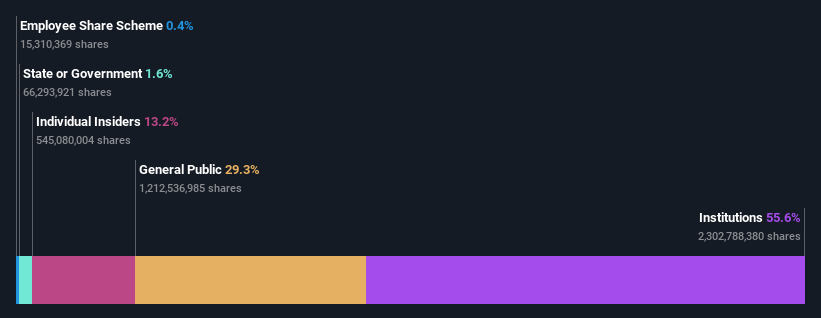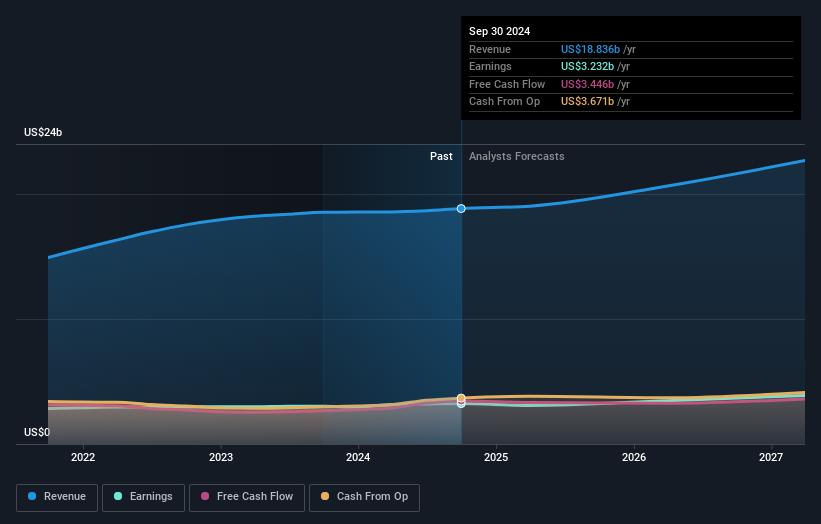Infosys Limited (NSE:INFY) is largely controlled by institutional shareholders who own 56% of the company

Key Insights
- Given the large stake in the stock by institutions, Infosys' stock price might be vulnerable to their trading decisions
- A total of 22 investors have a majority stake in the company with 51% ownership
- Recent sales by insiders
To get a sense of who is truly in control of Infosys Limited (NSE:INFY), it is important to understand the ownership structure of the business. And the group that holds the biggest piece of the pie are institutions with 56% ownership. Put another way, the group faces the maximum upside potential (or downside risk).
Because institutional owners have a huge pool of resources and liquidity, their investing decisions tend to carry a great deal of weight, especially with individual investors. As a result, a sizeable amount of institutional money invested in a firm is generally viewed as a positive attribute.
Let's take a closer look to see what the different types of shareholders can tell us about Infosys.
See our latest analysis for Infosys

What Does The Institutional Ownership Tell Us About Infosys?
Institutions typically measure themselves against a benchmark when reporting to their own investors, so they often become more enthusiastic about a stock once it's included in a major index. We would expect most companies to have some institutions on the register, especially if they are growing.
We can see that Infosys does have institutional investors; and they hold a good portion of the company's stock. This implies the analysts working for those institutions have looked at the stock and they like it. But just like anyone else, they could be wrong. When multiple institutions own a stock, there's always a risk that they are in a 'crowded trade'. When such a trade goes wrong, multiple parties may compete to sell stock fast. This risk is higher in a company without a history of growth. You can see Infosys' historic earnings and revenue below, but keep in mind there's always more to the story.

Institutional investors own over 50% of the company, so together than can probably strongly influence board decisions. We note that hedge funds don't have a meaningful investment in Infosys. Life Insurance Corporation of India, Asset Management Arm is currently the company's largest shareholder with 9.8% of shares outstanding. BlackRock, Inc. is the second largest shareholder owning 5.5% of common stock, and SBI Funds Management Limited holds about 4.2% of the company stock.
After doing some more digging, we found that the top 22 have the combined ownership of 51% in the company, suggesting that no single shareholder has significant control over the company.
While it makes sense to study institutional ownership data for a company, it also makes sense to study analyst sentiments to know which way the wind is blowing. There are a reasonable number of analysts covering the stock, so it might be useful to find out their aggregate view on the future.
Insider Ownership Of Infosys
The definition of an insider can differ slightly between different countries, but members of the board of directors always count. Management ultimately answers to the board. However, it is not uncommon for managers to be executive board members, especially if they are a founder or the CEO.
Most consider insider ownership a positive because it can indicate the board is well aligned with other shareholders. However, on some occasions too much power is concentrated within this group.
It seems insiders own a significant proportion of Infosys Limited. Insiders own ₹1.1t worth of shares in the ₹8.0t company. That's quite meaningful. Most would be pleased to see the board is investing alongside them. You may wish to access this free chart showing recent trading by insiders.
General Public Ownership
With a 29% ownership, the general public, mostly comprising of individual investors, have some degree of sway over Infosys. While this size of ownership may not be enough to sway a policy decision in their favour, they can still make a collective impact on company policies.
Next Steps:
It's always worth thinking about the different groups who own shares in a company. But to understand Infosys better, we need to consider many other factors. To that end, you should be aware of the 1 warning sign we've spotted with Infosys .
Ultimately the future is most important. You can access this free report on analyst forecasts for the company.
NB: Figures in this article are calculated using data from the last twelve months, which refer to the 12-month period ending on the last date of the month the financial statement is dated. This may not be consistent with full year annual report figures.
New: AI Stock Screener & Alerts
Our new AI Stock Screener scans the market every day to uncover opportunities.
• Dividend Powerhouses (3%+ Yield)
• Undervalued Small Caps with Insider Buying
• High growth Tech and AI Companies
Or build your own from over 50 metrics.
Have feedback on this article? Concerned about the content? Get in touch with us directly. Alternatively, email editorial-team (at) simplywallst.com.
This article by Simply Wall St is general in nature. We provide commentary based on historical data and analyst forecasts only using an unbiased methodology and our articles are not intended to be financial advice. It does not constitute a recommendation to buy or sell any stock, and does not take account of your objectives, or your financial situation. We aim to bring you long-term focused analysis driven by fundamental data. Note that our analysis may not factor in the latest price-sensitive company announcements or qualitative material. Simply Wall St has no position in any stocks mentioned.
About NSEI:INFY
Infosys
Provides consulting, technology, outsourcing, and next-generation digital services in North America, Europe, India, and internationally.
Flawless balance sheet established dividend payer.
Similar Companies
Market Insights
Community Narratives



